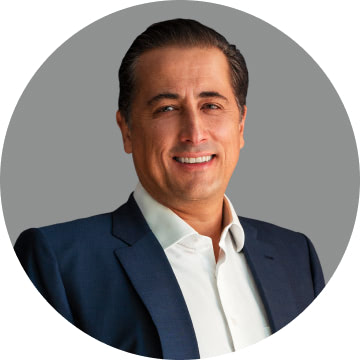Annual Report



At Mattos Filho, we believe we can go beyond the legal realm and drive the transformation that Brazilian society needs.
When reflecting on who we should invite to participate in the guest interview of our Annual Report, the choice naturally fell on two entrepreneurs whose work and efforts go far beyond the professional sphere: Geyze Diniz and Abilio Diniz.

In this special conversation with our partner Flávio Pereira Lima, Geyze and Abilio share their view on how to grow Brazil and promote business, tackle some of the country's major social issues, and outline aspects of effective management. They emphasize the importance of humane leadership in achieving an ideal balance between business, family, and well-being.

Geyze Diniz is a board member of Península Participações, Instituto Verdescola, the Social Council of the Federation of Industries of the State of São Paulo (FIESP), and Vice-Chairman of the São Paulo Museum of Art (MASP). An economist, she is the creator of the Taeq brand and Plenae, a digital portal focused on well-being. She is also a co-founder of the Pacto Contra Fome (Pact Against Hunger) movement, which works to combat hunger and reduce food waste in Brazil.
Abilio Diniz is the Chairman of Península Participações and a board member of Carrefour Global and Carrefour Brazil. He is a professor in the "Management and Leadership" course at the Brazilian higher education institution Fundação Getúlio Vargas (FGV), where he helps to train new leaders. Together with his father, he was responsible for the creation and development of the Pão de Açúcar Group.

Flávio Pereira Lima: Abilio, in the midst of the pandemic, we spoke to you at one of our online events. You mentioned that one must be serene in order to face difficult times. You also said there was one thing you were certain of – that every crisis has an end. Now that the pandemic is over, how do you think Brazil is going?
Abilio Diniz: We need to grow. Without growth, we won't be able to help Brazil’s entire population. We need investment. Last year, the investment rate was nearly 20% of GDP. We need to aim for 25%. The world has a vast amount of capital, but what is lacking is management. And what does capital require to invest? Political stability and legal security. We are a country with over 200 million people and enormous consumption potential. Brazil has all the conditions to grow. And if we take the right path, know where we're going and how to get there, we will grow.
Flavio: Geyze, can you tell us a bit about the Pact Against Hunger (Pacto Contra Fome) and how civil society can get involved in this project?
Geyze: The Pact Against Hunger is a civil society movement that will work alongside governments to combat hunger and food waste in Brazil. Our vision is that by 2030, nobody in Brazil will suffer from hunger, and by 2040, everyone will be properly nourished. The pact serves as a think tank for gathering intelligence and data. We want to mobilize the three sectors: private, civil society, and government, to join forces in this fight.
We currently have three main areas of action. Firstly, we serve as a hub for initiatives. We invite all existing initiatives, whether from civil society, the private sector, or even the government, to join this platform so that we can provide visibility and foster synergy among them, while understanding the impact they make. The second pillar is to work within the private sector through ESG (Environmental, Social, and Governance) efforts. The "S" – social – aspect is still not widespread, and we work together with the financial sector to help drive this forward. Through the private sector, we focus on finding ways to compensate for waste in favor of combating hunger. The third major component is advocacy and public policies.
Flávio: Abilio, you always talk about your purpose, your pillars. How have you systematized this in your life, and what are they?
Abilio: I study a lot; I’m always seeking to learn. I have a very clear purpose, which is to be happy, to learn, and to share. That's why I‘ve written two books, I give lectures, and I teach at the Getulio Vargas Foundation (FGV). In short, I share what I have learned throughout my life. Although I was born into a humble family that I am very proud of, I was still bequeathed a great inheritance. My father passed on the values of honesty and ethics to me, while my mother introduced me to God. My values define the path I walk on, and my pillars are what support me in this life.
The second thing I rely on is physical activity. I have always been a bit of an athlete, and I also pay close attention to nutrition. The third pillar is self-knowledge, being aware of your emotions. The fourth pillar is stress control. You just need to clearly define what makes you stressed in life. What is important? Yourself, your health, your family. The rest is just life. The fifth pillar is the faith I have in God. My mother instilled that in me, and I carry it with me throughout my life. And the sixth pillar is love. I cannot imagine a life without love, but it's not just love for a person or for your children. It's love for life, for what you have, and even more for what you aspire to, what you want to be. Love for your daily life, love for feeling well, happy, and at peace, feeling the joy of being alive. That's love, the engine of the car of life.
My values, as I mentioned, are honesty, ethics, and humility. Being humble means being respectful and aware that you don't know everything, that you always need to keep learning, and that someone else's opinion may be better than yours. After that, there’s determination and perseverance. You need to know what you want. I believe that everyone chooses what they want to be in life and pursues their goals. Discipline is another important value, but for me, the main value is emotional balance. It's knowing that in life, you have roles and activities and that within these, you must maintain balance. That's the wisdom of life.
Flávio: Talking to both of you, it's clear that you have a very clear sense of your purpose. Why is it important to have a purpose?
Geyze: Purpose is what really drives you towards something. Our purpose also changes throughout our lives. It can change based on our level of maturity or the moment we're experiencing. The more consistent it is, deep down, the easier it is to make good choices along the path. It doesn't necessarily have to be something philanthropic; it doesn’t have to directly help someone. A purpose can be something related to personal growth. As we evolve as individuals, we change our environment.
Abilio: The world has 8 billion people. If you start to think about it, I am one among 8 billion; I'm nothing. Yet each person is unique. They are replaceable in terms of what they do and the way they act, but no one can actually replace a person. So, if we are unique, we have to think about what we are doing here, in this world, in this life. If there is one goal I want to pursue in life, it is to be happy. So, my purpose is to be happy, to learn.
When I graduated from FGV, I practically had no job, nothing. I worked with my father, who had a pastry shop and a catering service. Yet that wasn't what I wanted to do in life; I’d thought about becoming a professor. I applied to Michigan State University and was ready to go when my father came up with the idea of opening a supermarket. There were very few in Brazil. I went to see it and thought, "There's a real business here." So, I abandoned the idea of becoming a professor, a goal I went on to achieve much later. This fits with my purpose, and it gives me satisfaction and joy to be able to pass on things I have learned – especially to young people, so that they can build a better world when they are older.
Flávio: How can we reconcile a balanced life with high-performance work?
Abilio: Everyone has their own way, their own style. I work a lot, but I make sure to spend time with my family, to support them. The two are not incompatible. You have to know when to pay attention to your family and when to dedicate time to yourself. Whether in relation to sport, to sleep – sleep is crucial – or to having fun. You have to account for these roles.
Flávio: Geyze, as a woman who takes a stand, who confronts what bothers her, what would you say are three major lessons you’ve learned throughout your journey, three things you could share with us?
Geyze: The main one is self-awareness. As you get to know yourself, you also understand the world around you and have more empathy for others. Another is spirituality – and I'm not even talking about religion. I'm talking about connecting with a higher power you believe in and dedicating yourself to it. And a third point is gratitude. One day, I decided to challenge myself: I wanted to understand if gratitude has any correlation with longer lives and well-being. We hired a professor, an expert in scientific studies, who confirmed that there is a correlation between gratitude and a longer and happier life.
So, I exercise gratitude daily, whether in regard to small things or to an event that was much more impactful for us – the recent passing of João Paulo [Diniz, Abilio’s son]. In the aftermath, Abilio and I were talking, and I said to him, "Even though we're obviously sad, let's try to look at it from a glass-half-full perspective." You lived with your son for almost 59 years. I had the privilege of living with João for over 20 years too. And that's gratitude.
We managed to look at the good things in life. It has transformed my life. Of course, there are moments when it’s harder, but it's a process that I believe in deeply.
Flávio: Abilio, what qualities should a leader who wants to drive transformation have?
Abilio: A good leader is someone who is capable of bringing out the best in their followers for the collective benefit. A leader needs to know that many people will approach them and say what they think the leader wants to hear, not what the leader needs to hear. A leader needs to be human. They need to consider that they are leading people, not machines. It's not necessarily about being a nice leader, it's about being a leader who knows what they are doing. They need to be aware of that and do their best, but it's not just about being the best. A leader needs to do what people expect of them. Above all, people expect them to succeed – they have to pursue victory.
Abilio: Abilio, if you could go back in time and talk to that young man in his twenties starting out in the world of business, what advice would you give him?
Abilio: What I have learned since my youth is that love is more beautiful than hatred, that reconciliation is not only more beautiful but more efficient than fighting, and that if you can find a path of goodness, reconciliation, and agreement, it will be better than the path of conflict, the path of winning at all costs. It's something that has evolved throughout my life. What would I say to him? Be patient. Try to stick to the path of goodness because it will lead you to greater success.